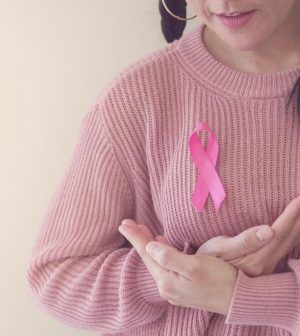- Could Your Grocery Store Meat Be Causing Recurring UTIs?
- Are You Making This Expensive Thermostat Error This Winter?
- Recognizing the Signs of Hypothyroidism
- 10 Strategies to Overcome Insomnia
- Could Artificial Sweeteners Be Aging the Brain Faster?
- Techniques for Soothing Your Nervous System
- Does the Water in Your House Smell Funny? Here’s Why
- Can a Daily Dose of Apple Cider Vinegar Actually Aid Weight Loss?
- 6 Health Beverages That Can Actually Spike Your Blood Sugar
- Treatment Options for Social Anxiety Disorder
New Therapeutic Vaccine Gives Hope Against an Aggressive Breast Cancer

An experimental vaccine could offer fresh hope to women diagnosed with an aggressive and hard-to-treat form of breast cancer, new research suggests.
The vaccine appears to be safe and effective against triple-negative breast cancer — a type that can’t be treated with hormone therapy because it isn’t driven by any of the three hormones that typically fuel breast cancer.
The good news? Sixteen of 18 patients remained cancer-free three years after receiving the vaccine, which taught their immune systems to kill off any remaining cancer cells, according to results published Nov. 13 in the journal Genome Medicine.
By comparison, only half of patients who receive surgery alone remain cancer-free after three years, according to historical data.
“These results were better than we expected,” said senior researcher Dr. William Gillanders, a professor of surgery at Washington University School of Medicine in St. Louis.
The early clinical trial involved 18 patients with triple-negative breast cancer that hadn’t spread elsewhere in the body.
About 10% to 15% of the breast cancers that occur in the United States are triple-negative, according to the National Breast Cancer Foundation.
To date, triple-negative breast cancer has no targeted therapies. It must be treated with traditional approaches like surgery, chemotherapy and radiation therapy, researchers said in background notes.
The trial patients all had undergone chemotherapy, followed by surgery to remove their breast tumors, researchers said.
The research team analyzed the tumor tissue following surgery to find unique genetic mutations in the patients’ cancer cells. They then crafted a personalized cancer vaccine for each patient, based on those mutations.
Each patient received three doses of the vaccine, which taught their immune systems to recognize the key mutations in their specific breast tumors and attack the cancer cells, the researchers said.
Results showed that 14 out of the 18 patients with triple-negative breast cancer developed an immune response to the vaccine.
“We are excited about the promise of these neo-antigen vaccines,” Gillanders said. “We are hopeful that we will be able to bring more and more of this type of vaccine technology to our patients and help improve treatment outcomes in patients with aggressive cancers.”
However, researchers warned that larger clinical trials are needed to prove the vaccine’s effectiveness.
“We acknowledge the limitations of this type of analysis, but we are continuing to pursue this vaccine strategy and have ongoing randomized controlled trials that do make a direct comparison between the standard of care plus a vaccine, versus standard of care alone,” Gillanders said. “We are encouraged by what we’re seeing with these patients so far.”
More information
The National Breast Cancer Foundation has more on triple-negative breast cancer.
SOURCE: Washington University School of Medicine, news release, Nov. 13, 2024
Source: HealthDay
Copyright © 2026 HealthDay. All rights reserved.










